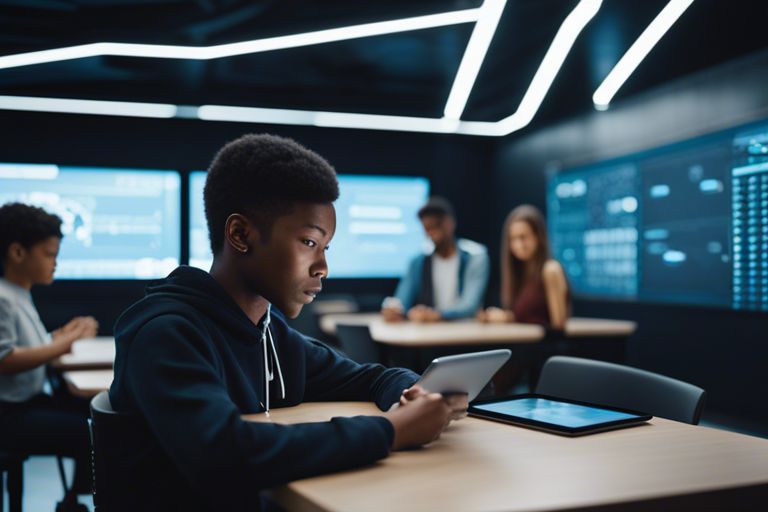AI chatbots are revolutionizing the way students receive homework help, offering 24/7 assistance and personalized learning experiences. These intelligent systems can provide instant feedback, explanations, and guidance on various subjects, leading to improved grades and a deeper understanding of the material. By leveraging the power of AI technology, students can access reliable support whenever they need it, enhancing their academic journey in a convenient and efficient manner.

The Current State of Homework Help
The Struggle is Real: Students’ Perspective
Realizing the struggle that many students face with their homework is crucial in understanding the need for better solutions. Students often find themselves overwhelmed with the amount of work they have to complete outside of school hours. This can lead to stress, anxiety, and a lack of motivation to learn. Additionally, students may feel embarrassed or afraid to ask for help from teachers or parents, further hindering their academic progress.
The Burden on Teachers and Parents
Perspective
With the increasing demands on teachers to cover extensive curriculum and parents balancing work and household responsibilities, homework help can become a challenging task. Teachers may not always have the time to provide individualized assistance to students struggling with their assignments, and parents may not feel equipped to help with complex subject matter. This can create a disconnect in the learning process and lead to frustration for both educators and families.
The Rise of AI Chatbots
Even as little as a decade ago, artificial intelligence (AI) chatbots were primarily seen as virtual assistants, capable of answering basic queries and setting reminders. However, with advancements in technology and machine learning algorithms, AI chatbots have evolved into powerful educational tools, especially in student homework help.
From Virtual Assistants to Educational Tools
Rise in AI capabilities has led to the transformation of chatbots from simple assistants to sophisticated educational aids. These chatbots can now engage in complex conversations, provide detailed explanations, and offer personalized assistance to students tackling homework assignments. By leveraging AI, chatbots have become integral in shaping the future of education by offering real-time support and enhancing learning experiences.
The Potential of AI in Education
Any discussion about the future of education is incomplete without acknowledging the transformative potential of AI. AI-powered chatbots have the ability to revolutionize the way students learn by providing instant feedback, personalized learning paths, and round-the-clock assistance. These chatbots can adapt to individual learning styles and pace, making education more accessible and effective for students of all levels.
Another significant advantage of AI chatbots in education is their scalability. These virtual assistants can cater to a large number of students simultaneously, ensuring that each learner receives the attention and support they need. With the ability to handle a wide range of subjects and topics, AI chatbots have the potential to supplement traditional teaching methods and bridge the gap in educational resources.
How AI Chatbots Can Help with Homework
Personalized Learning Experiences
For students, one of the key benefits of using AI chatbots for homework help is the opportunity for personalized learning experiences. These chatbots can adapt to each student’s individual needs and learning style, providing tailored explanations and guidance. By offering customized support, AI chatbots can help students grasp concepts more effectively and improve their academic performance.
Instant Feedback and Assessment
To aid in the learning process, AI chatbots offer instant feedback and assessment on homework tasks. This immediate response helps students identify their mistakes and misconceptions quickly, allowing them to correct errors in real-time. Additionally, chatbots can track a student’s progress over time, highlighting areas that may require additional focus or practice.
Learning with AI chatbots can streamline the homework completion process for students by providing them with valuable support and resources. The interactive nature of chatbots makes studying more engaging and can increase students’ confidence in tackling challenging assignments.
The Benefits of AI Chatbots for Students
Increased Confidence and Motivation
Many students often struggle with homework assignments, feeling overwhelmed by the complexity of the tasks or lacking confidence in their abilities. AI chatbots can provide personalized assistance to students, offering guidance and support in real-time. By having a virtual tutor available 24/7, students can boost their confidence levels and feel more motivated to tackle challenging problems. The instant feedback and encouragement from AI chatbots can help students overcome their doubts and improve their academic performance.
Improved Time Management and Organization
For students, juggling multiple assignments and deadlines can be a daunting task. An AI chatbot can help students stay on track by providing reminders, setting study schedules, and breaking down tasks into manageable steps. By incorporating AI technology into their study routine, students can streamline their workflow and prioritize tasks effectively. With the support of AI chatbots, students can optimize their time management skills and develop better organizational habits to enhance their overall academic experience.
To sum up, AI chatbots offer students a range of benefits, including increased confidence, motivation, improved time management, and organizational skills. By leveraging the power of AI technology, students can enhance their learning experience and achieve academic success more efficiently.
The Role of AI Chatbots in Supplementing Traditional Teaching
Filling Knowledge Gaps and Reinforcing Concepts
Reinforcing understanding of key concepts is crucial for student success. AI chatbots can play a pivotal role in this process by providing students with additional support outside the classroom. When students encounter challenges or have questions while working on homework assignments, chatbots can fill in knowledge gaps by offering immediate explanations and examples. By reinforcing concepts in real-time, students can gain a deeper understanding of the material, leading to improved academic performance.
Enhancing Teacher-Student Interaction
Supplementing traditional teaching methods, AI chatbots can enhance teacher-student interaction by providing personalized assistance to students. Teachers often have limited time to address individual student needs during class. However, chatbots can offer personalized feedback, guidance, and support to students on a one-on-one basis. This not only empowers students to take control of their learning process but also allows teachers to focus on facilitating in-depth discussions and activities during class time.
To maximize the benefits of AI chatbots in enhancing teacher-student interaction, it is important for educators to integrate these tools seamlessly into the learning environment. By establishing clear guidelines for the use of chatbots and ensuring that they complement rather than replace traditional teaching methods, teachers can create a balanced and effective educational experience for their students.
Addressing Concerns and Misconceptions
The Fear of Job Replacement
Replacement Unlike what some may fear, AI chatbots are not designed to replace teachers or educators. Instead, these tools are meant to complement the learning experience and provide additional support to students. By automating routine tasks like answering frequently asked questions or providing explanations for straightforward concepts, teachers can focus their efforts on more personalized interactions with students.
Ensuring Academic Integrity and Authenticity
Replacement One of the primary concerns surrounding AI chatbots for student homework help is the potential for misuse, such as students using the chatbots to obtain answers without understanding the concepts. However, safeguards can be implemented to promote academic integrity and authenticity. For example, chatbots can be programmed to provide hints and guidance rather than direct answers, encouraging students to think critically and solve problems on their own.
This approach not only discourages academic dishonesty but also promotes a deeper understanding of the material. Additionally, educators can monitor students’ interactions with the chatbots to identify any patterns of misuse and intervene when necessary, ensuring that the technology is used responsibly.
The Future of AI Chatbots in Education
Once again, the future of AI chatbots in education looks promising as technology continues to advance at a rapid pace. Two key areas where significant progress is being made include advancements in natural language processing and the integration of AI with existing educational platforms.
Advancements in Natural Language Processing
Language is at the core of how AI chatbots interact with students, and recent advancements in natural language processing are making these interactions more seamless and human-like. AI chatbots are becoming better at understanding the nuances of human language, including slang, regional dialects, and context. This enhanced ability allows chatbots to provide more accurate and relevant assistance to students seeking homework help.
Integrating AI with Existing Educational Platforms
Education is undergoing a digital transformation, with many schools and universities adopting online learning platforms. By integrating AI chatbots with these existing educational platforms, students can access personalized support and assistance anytime, anywhere. These chatbots can supplement traditional teaching methods by offering additional explanations, guiding students through exercises, and providing instant feedback on assignments.
Future developments in AI chatbots for education could revolutionize the way students learn and receive help with their homework. With the potential to offer personalized learning experiences, instant feedback, and round-the-clock support, AI chatbots have the power to enhance student learning outcomes and make education more accessible and engaging for all.
Real-World Applications and Examples
Successful Implementations in Schools and Universities
Now, let’s examine into some successful implementations of AI chatbots in schools and universities. An increasing number of educational institutions are turning to AI chatbots to provide students with instant homework help and academic support. These chatbots are designed to answer students’ questions, provide explanations, offer resources, and guide them through challenging assignments.
Chatbot-Based Learning Platforms and Tools
Tools powered by AI chatbots are revolutionizing the way students learn and access educational resources. An AI chatbot integrated into a learning platform can personalize the learning experience, offer interactive quizzes, provide feedback on assignments, and even recommend additional study materials. This personalized approach helps students stay engaged, motivated, and on track with their academic goals.
Examples of chatbot-based learning platforms and tools include IBM Watson Assistant, Brainly, and Quizlet’s study chatbots. These tools leverage AI technology to enhance students’ learning experiences, making it easier for them to seek help, practice concepts, and improve their academic performance.
Overcoming Technical and Infrastructure Challenges
Ensuring Accessibility and Equity
Keep in mind that not all students may have access to high-speed internet or the latest devices, which could pose a challenge when implementing AI chatbots for homework help. An important consideration is ensuring that these resources are available to all students to guarantee equitable access to this innovative learning tool. Schools and educational institutions need to address these disparities by providing necessary infrastructure and support to bridge the digital divide.
Addressing Technical Issues and Downtime
Addressing technical issues and downtime is crucial to maintaining the effectiveness of AI chatbots for student homework help. With the reliance on technology, it’s inevitable to encounter technical glitches that could disrupt the learning process. Educational institutions must have a robust technical support system in place to quickly resolve any issues that arise, minimizing downtime and maximizing the potential benefits of AI chatbots in education.
Proactive monitoring and regular maintenance can help prevent technical issues from escalating, ensuring a smooth experience for students using AI chatbots for homework assistance.
The Importance of Human Oversight and Monitoring
Despite the impressive capabilities of AI chatbots in providing student homework help, human oversight and monitoring are vital components to ensure the effectiveness and reliability of these systems. Balancing AI autonomy with human guidance is crucial in maintaining the quality of assistance provided to students.
Balancing AI Autonomy with Human Guidance
Monitoring the interactions between students and AI chatbots allows educators to evaluate the accuracy and relevance of the assistance being offered. By supervising the chatbot’s responses, educators can intervene when necessary to provide additional explanations or correct inaccuracies. This human oversight ensures that students receive the most beneficial support in their learning process.
Preventing Bias and Inaccuracy
With the increasing reliance on AI technologies, preventing bias and inaccuracy is paramount in educational settings. AI chatbots must be programmed and monitored to avoid bias in their responses to student queries. Educators need to regularly review and update the chatbot’s knowledge base to ensure that the information provided is accurate and up-to-date.
The Potential for AI Chatbots to Support Special Needs Education
Tailoring Learning Experiences for Students with Disabilities
To unlock the benefits of AI chatbots for student homework help, it is crucial to acknowledge the potential they hold in supporting special needs education. AI chatbots have the capability to customize learning experiences based on individual student needs, making education more accessible and inclusive for students with disabilities. By recognizing and adapting to different learning paces and styles, AI chatbots can provide personalized assistance, ensuring that all students receive the support they require to succeed.
Providing Additional Support and Resources
One of the key advantages of AI chatbots in special needs education is their capacity to offer additional support and resources beyond the traditional classroom setting. AI chatbots can provide supplementary materials, exercises, and explanations tailored to the specific needs of students with disabilities, allowing them to reinforce their understanding and skills outside of school hours. This additional support can be invaluable in empowering students to overcome challenges and excel academically.
Experiences with AI chatbots have shown that they can be particularly beneficial for students with disabilities who may require extra guidance and reinforcement in their learning journeys. By offering a personalized and interactive learning experience, AI chatbots can help students build confidence, independence, and motivation, ultimately enhancing their overall academic performance and educational outcomes.
Measuring the Effectiveness of AI Chatbots
After implementing AI chatbots for student homework help, it is crucial to measure their effectiveness to ensure they are enhancing the learning experience. Through various assessment strategies, educators can evaluate the impact of chatbots on student outcomes and chatbot performance.
Evaluating Student Outcomes and Progress
Student outcomes and progress can be evaluated by analyzing the improvement in grades, completion rates of assignments, and student engagement levels. AI chatbots can track student interactions, identify areas of difficulty, and provide personalized support to guide students towards academic success. By monitoring and analyzing these metrics, educators can assess the effectiveness of AI chatbots in supporting student learning.
Assessing Chatbot Performance and Improvement
Any educational technology tool, including AI chatbots, needs to be continuously assessed for performance and improvement. Educators can evaluate the accuracy of chatbot responses, the speed of resolving student queries, and the overall impact on student learning outcomes. By collecting feedback from students and analyzing chatbot interactions, educators can make necessary adjustments to enhance the chatbot’s effectiveness in providing homework help.
Plus, it’s imperative to ensure that chatbots are continually learning and evolving their capabilities to meet the changing needs of students and educators. By leveraging data analytics and machine learning algorithms, chatbots can improve their performance over time and provide more accurate and personalized assistance to students.
The Broader Implications of AI Chatbots in Education
Rethinking the Role of Teachers and Educators
Many believe that the integration of AI chatbots in education signals a shift in the traditional roles of teachers and educators. While AI chatbots can provide immediate assistance and support to students, it also raises questions about the future role of teachers in the classroom. Education experts suggest that rather than replacing teachers, AI chatbots can complement their work by automating routine tasks and providing personalized learning experiences. This shift allows educators to focus more on mentoring, guiding critical thinking, and fostering creativity in students.
Preparing Students for an AI-Driven Future
Rethinking how students learn and interact with AI technology is imperative in preparing them for an increasingly AI-driven future. AI chatbots can help students develop imperative skills such as problem-solving, critical thinking, and digital literacy. By incorporating AI chatbots into the educational system, students can gain valuable experience in working alongside AI tools, preparing them for the evolving job market where AI integration is becoming more prevalent.
Understanding the broader implications of AI chatbots in education is crucial for shaping the future of learning. While AI chatbots offer numerous benefits in terms of personalized learning and immediate feedback, it is important to acknowledge the potential challenges they pose, such as the risk of over-reliance on technology and the need to ensure equitable access to AI tools for all students. By embracing the potential of AI chatbots in education while addressing these challenges, we can create a more dynamic and effective learning environment for students.
1. AI chatbots provide instant help for student homework questions.
2. Increases student engagement and participation in learning.
3. Personalized assistance tailored to individual student needs.
4. Enhances student learning experience with interactive and adaptive responses.
5. Reduces teacher workload by providing additional support for students.
6. Improves student confidence, independence, and academic performance.
To wrap up
So, it is evident that AI chatbots have the potential to revolutionize student homework help by providing personalized assistance, instant feedback, and round-the-clock support. With the advancements in artificial intelligence, these chatbots can cater to individual learning styles and pace, making the learning experience more efficient and effective.
After all is said and done, integrating AI chatbots into the education system can greatly benefit students by enhancing their problem-solving skills, increasing their engagement with the material, and ultimately improving their academic performance. As technology continues to evolve, it is vital for educators to embrace these innovations and unlock the full potential of AI chatbots for student homework help.
FAQ
Q: What are AI chatbots?
A: AI chatbots are computer programs designed to simulate human conversation using artificial intelligence.
Q: How can AI chatbots benefit student homework help?
A: AI chatbots can provide instant assistance to students by answering questions, providing explanations, and guiding them through difficult problems.
Q: Are AI chatbots effective in helping students with their homework?
A: Yes, AI chatbots can be highly effective in helping students with their homework by offering personalized support and round-the-clock availability.
Q: Can AI chatbots replace human tutors or teachers?
A: While AI chatbots are helpful tools, they cannot completely replace human interaction and the expertise of teachers or tutors.
Q: How can students access AI chatbots for homework help?
A: Students can access AI chatbots for homework help through educational websites, mobile apps, and messaging platforms integrated with AI technology.
Q: What subjects can AI chatbots assist students with?
A: AI chatbots can assist students with a wide range of subjects, including math, science, history, language arts, and more.
Q: Are AI chatbots personalized to each student’s needs?
A: Many AI chatbots for student homework help are designed to be personalized, offering tailored assistance based on individual learning styles and needs.




